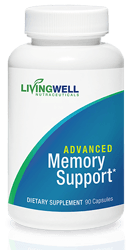8 Best Ways
 Even the best of us misplace our car keys from time to time, and that’s completely normal. But if you notice that you’re forgetting names and phone numbers or misplacing items, and feel your memory is not working as well as it used to (a condition referred to as Subjective Cognitive Impairment (SCI)), it’s time to take action to keep your brain sharp.
Even the best of us misplace our car keys from time to time, and that’s completely normal. But if you notice that you’re forgetting names and phone numbers or misplacing items, and feel your memory is not working as well as it used to (a condition referred to as Subjective Cognitive Impairment (SCI)), it’s time to take action to keep your brain sharp.
In fact, by the age of 65, 25-55 percent of adults have SCI that will progress to mild cognitive impairment within 15 years.[i] Mild cognitive impairment, meanwhile, is more pronounced memory loss that, while not necessarily interfering with your daily life, has been found to increase your likelihood of developing dementia including Alzheimer’s disease.
Even mild changes in your memory may be caused by the same lesions associated with Alzheimer’s,[ii] so ideally the time to take action to protect your brain is before any noticeable loss has occurred. That said, if you notice your memory slowing, it’s even more important that you embrace the steps that follow, which are among the best to protect and improve your memory.
How to Improve Your Memory in 8 Easy Steps
8. Review Your Medications
Quite a few medications can cause or contribute to memory loss. If you’ve noticed memory lapses that seem to coincide with starting a new prescription, talk with your health care provider. Examples of medications that are associated with memory problems include pain medications, antidepressants, antihistamines, anti-anxiety medications, muscle relaxants, sleeping pills, statins and tranquilizers.
7. Up Your Intake of B Vitamins
 B vitamins, including thiamin, niacin, folate, and vitamin B12, have been shown to cut the rate of brain shrinkage among elderly people with mild cognitive impairment in half.[iii] B vitamins are thought to be effective for brain health because they help lower concentrations of homocysteine, an amino acid that’s a risk factor for brain atrophy, cognitive decline and dementia.
B vitamins, including thiamin, niacin, folate, and vitamin B12, have been shown to cut the rate of brain shrinkage among elderly people with mild cognitive impairment in half.[iii] B vitamins are thought to be effective for brain health because they help lower concentrations of homocysteine, an amino acid that’s a risk factor for brain atrophy, cognitive decline and dementia.
Seafood and animal foods, such as meat, dairy and eggs, are good sources of B vitamins (and the only sources of vitamin B12). B vitamins can also be found in legumes, fruits and vegetables, including leafy greens, avocado, Brussels sprouts and parsnips.
6. Stay Social
Like your muscles, if you stop using your brain it will quickly slow down. This is why the more you challenge and excite your brain by meeting new people, getting together with friends and learning new hobbies, the greater your brainpower will be. Try volunteering, chatting with your neighbors, taking a cooking class or even carpooling to work; all of these have the potential to give your memory a boost.
5. Clean Up Your Diet
You knew it was coming … you’ve got to eat right if you want to keep your brain in top working order. In addition to the “usual” (lots of fruits and veggies, and healthy sources of protein and fat, including omega0-3 fats), make sure you’re not overdoing alcoholic beverages, trans fats or sugar — all of which are detrimental to your brain health.
You can add improving your memory to the long list of benefits meditation provides. Meditation, and in particular mindfulness training, has been found to significantly improve working memory capacity while reducing mind wandering.[iv]
3. Sleep
If you’re like many adults who have trouble falling asleep and staying asleep, it could be harming your memory. Sleep is actually essential for the storage of long-term memories, and sleep disturbances are known to decrease short-term memory as well. If you have trouble sleeping, you can find tips for a good night’s sleep here. Remedying your nighttime sleep is crucial, but even a mid-day nap can help to boost and restore your brainpower.[v]
2. Exercise
The evidence couldn’t be clearer that getting regular exercise is a key factor in keeping your memory sharp well into old age. One study, for instance, found that both verbal and spatial memory improved in older adults with mild cognitive impairment when they exercised just twice a week for six months.[vi] Perhaps this is because exercise has been found to promote neurogenesis, or the growth of new brain cells, in the hippocampus, an area of the brain that plays an important role in memory.[vii]
It’s also been shown that exercising after you’ve learned a new task may help to strengthen those memories.[viii] So if you’re not yet a regular exerciser, there’s no time like the present to become one (and if you have 4 minutes, you can fit in a workout).
1. Sharpen Your Mind With Advanced Memory Support
 What is Advanced Memory Support? It’s a new comprehensive brain formula that floods your brain with powerful memory-boosting nutrients while at the same time soothing your nerves and helping to restore balance in your body and mind (stress is a major culprit in zapping your brain’s potential).
What is Advanced Memory Support? It’s a new comprehensive brain formula that floods your brain with powerful memory-boosting nutrients while at the same time soothing your nerves and helping to restore balance in your body and mind (stress is a major culprit in zapping your brain’s potential).
With ingredients like L-tyrosine, which is essential for the production of important neurotransmitters, alpha-lipoic acid, a powerful antioxidant for your brain, vinpocetine, which helps boost brain cell energy and circulation, and much, much, more (like a healthy serving of brain-boosting B vitamins), Advanced Memory Support offers memory-boosting benefits that are unlike those any other supplement on the market can provide.
But how do you know if Advanced Energy Support is right for you? Take this short five-question quiz to find out …


